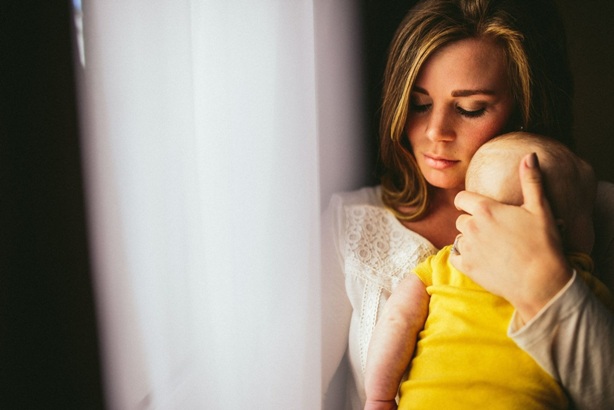I read an article that said fetal cells are often found roaming in mothers’ bodies long after their babies are born.
Of course, I thought. My eyes skimmed the science of it with amazement. But my body reacted viscerally, like it already knew this secret truth. Of course my body swims with the remnants of my babies, a cellular metaphor for the morph of motherhood. Our children—quite literally—change us, mark us, stain us, in a way that can’t be undone.
Becoming a mother was, for me, something like grief. In the early days, wrecked from sleeplessness and need, I mourned the person I’d been before having kids. The version of me who walked freely, who molded her own days according to her moods, whose body was wholly her own and neither a milk factory or a jungle gym. I knew that somehow, in the squint of the future, waited the person who I would someday be. I’d have some of my freedom back, some of my time. But in the blurry beginning, I floated somewhere in between these two versions of myself—I was not who I’d been, and I was not yet who I’d be.
I’ll admit it—back then, I wished time away. Even as I gazed into my babies’ steely eyes, I wished for that future self. It was like when I was a child yearning for the wide freedom of adulthood, the thrill of having my own space and rules. I could barely wait for the day when my babies would need me just a pinch less, and I’d be able to regain something of myself.
And now I am here.
The other night at dinner, my seven-year-old son blurted, “In 10 years, I’ll be 17. Almost a grown-up!” He pushed a cluster of macaroni and cheese onto his fork. “And you,” he said, pointing at his little sister, “You’ll be 14.”
I stared across the table at him, trying to imagine this future-him, while he did the same. “But that’s kind of sad, too, because then I won’t be a kid anymore,” he added. My eyes welled up as I watched him, for the first time, twirl in the tension between childhood and adulthood.
“Can we stop talking about this?” my four-year-old daughter asked. I looked at her face. Her eyes were wide and wet.
“Is it making you sad?” I asked her. She nodded.
“It’s making me a little sad, too,” I said, my voice breaking. My kids both looked at me. I let them see a sliver of my sadness before I pushed it aside while I cleaned up dinner and got them ready for bed. The grief waited for me until I was alone before it crashed over me. They will leave you, I told myself as tears slipped down my face. This is what they’re supposed to do.
Being a mother to young children means wading through the daily chaos of need and chores while also looking down the barrel of their leaving. It’s loving—with every cell of your body—these wild little people who are changing as fast as they’re breathing. It leaves your heart raw and full and flexing.
I try, sometimes, to imagine the people they will become. But I can’t. It’s too much. Life is too unpredictable, too much wider than my narrow imagination.
I can’t imagine it anymore than I could’ve imagined, when they were babies, the people they’d be now. I can’t imagine it anymore than I could’ve imagined my own future back when I was waiting for it to arrive: all the twists and turns, all the heartbreak and heaven.
Today, they are at school. I savor this time, this time that I waited for, dreamt of. It’s luscious, but like any other future, it’s not quite what I imagined. If I think too hard about them—the image of my son sitting at his desk, scrawling sloping letters. My daughter painting pictures of purple water and sunlight. It’s almost too much, the way they’re already out in the world without me.
But I’m not without them.
Being a mother is cupping our hands around all of our childrens’ past, shedded selves: the toddler who spent several weeks with a cinnamon jar clasped in his chubby fist. The baby who always made a high-pitched howl just before she sneezed. It’s the stabbing ache of knowing that the present is waiting to become the past. The seven-year-old imagining the future he will step into. The four-year-old who only wants mama’s warm arms—for now. Our children are in our hands, in our hearts, in our bones.
The seeds of their cells float through me, unseen: perhaps in the tip of my pinky finger. In the blood that flickers between my ribs. Maybe they are even in my brain, as I turn words over, searching for ones that pulse and shine. Wherever they are, they remind me always: I am not who I once was. I am flush with love. I am heartbroken. I am theirs.
Author: Lynn Shattuck
Editor: Catherine Monkman
Image: Sarah Graybeal/Unsplash







Read 5 comments and reply